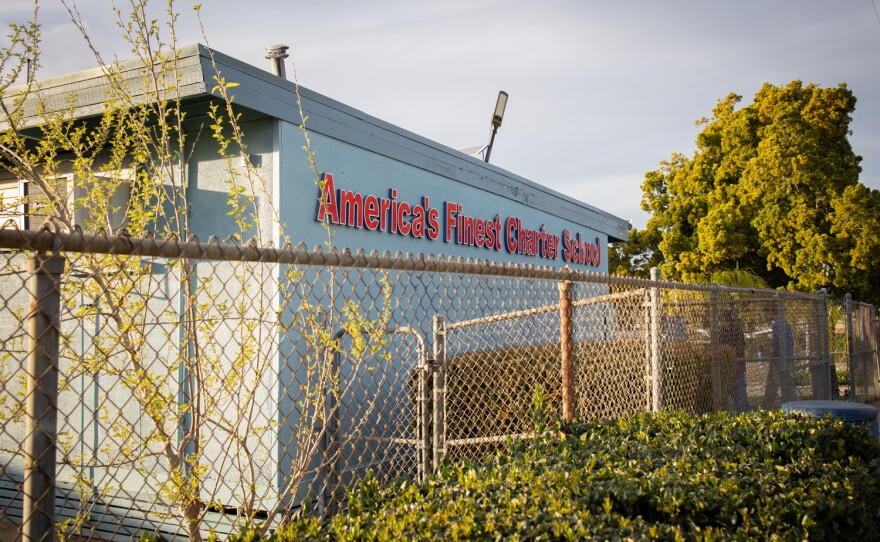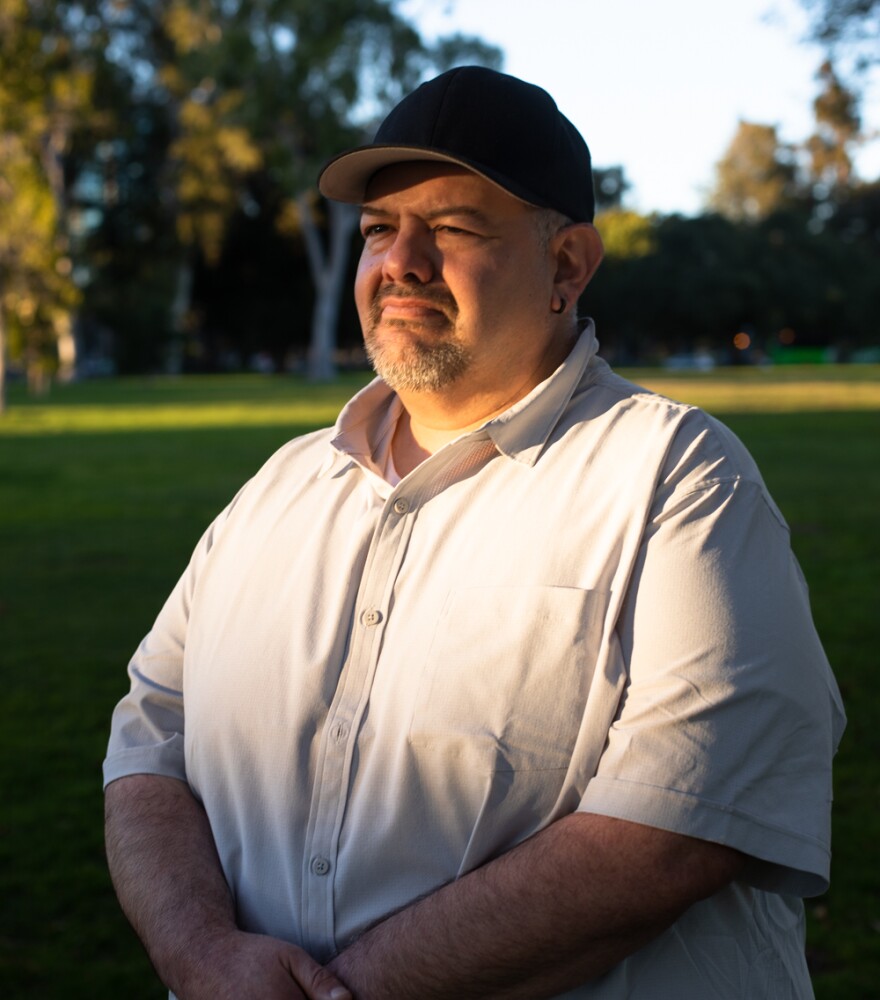A financially strapped charter school in southeast San Diego laid off employees to help address a nearly $1 million deficit, but some are now raising concerns about its leadership and how the cuts were decided.
Officials at America’s Finest Charter School, which serves students from transitional kindergarten through 12th grade, say enrollment declines prompted a drop in funding and a warning from outside finance officials that cash would run out by winter.
That led the Chollas View school to take action, including a spending freeze, a more aggressive recruitment campaign — and eight layoff notices. But few details have been provided on how school officials signed off on the staffing cuts, and one laid-off employee has alleged age discrimination while another has retained an attorney.
The layoffs also have prompted a slew of other concerns to come to light, including the use of an out-of-state consultant for a wide variety of administrative duties and allegations of nepotism within the school’s leadership.
Since 2020, the school has contracted with outside administrator Jonathan Dean for a variety of services, renewing his contract even after he moved across the U.S. inewsource found his role at the school has included making personnel decisions and involving himself in board vacancy discussions — all while living in North Carolina.
Last year, Dean was tasked with supervising Executive Director Tim Bagby’s wife, K-8 Principal Kimberly Bagby, to avoid potential conflict of interest until the arrangement was flagged by San Diego Unified School District’s charter office.
Bagby, who was hired prior to her husband’s promotion to executive director, now reports directly to the school board. And Dean has since signed a new contract, with duties that include working in liaison with San Diego Unified for a planned construction project.
The San Diego Unified School District is the authorizing entity for America’s Finest Charter School. Charter schools operate separately from the district but are held to higher accountability standards.
With a $3.5 billion bond measure that passed in 2018, the district will construct and improve new facilities, including at its authorized charter schools. That includes the planned construction of a new K-8 campus for America’s Finest Charter that’s set to begin this year.
But text messages that inewsource obtained show he attempted to play a larger role at the school, including efforts to sway public votes in real time as the board considered candidates for a vacant seat and proposing bylaw changes that would render others ineligible.
Dean did not respond to a request for comment.
Executive Director Bagby, who declined an interview but responded to emailed questions from inewsource, said Dean “did not do anything more than what any other member of the public could do,” but that he and the board president agreed “that Dr. Dean will no longer be attending board meetings and will not be contacting board members.”
“We are both keenly aware of the perception his actions may have left with the public as well as our families and staff,” Bagby said.
‘That is not his purview’
Dean began working as a consultant at the school two months after he was fired as superintendent at The O’Farrell Charter School in San Diego’s Encanto neighborhood. At the time, America’s Finest Charter was run by Bagby’s predecessor, Jan Perry.
Dean’s contract has been renewed several times, with the most recent agreement spanning three years and stipulating broad duties such as developing both administrative and board policies and advising Bagby on “educational issues that may arise.” He will receive more than $4,000 a month through 2026.
About Jonathan Dean, the school’s out-of-state consultant
Dean has served as an outside consultant at America’s Finest Charter since 2020, and was first hired two months after his termination at another southeast San Diego charter school. As inewsource previously reported, Dean was accused of misconduct involving a female staffer, but The O’Farrell Charter School fired him without cause and ultimately reached a settlement with the school in which he denied any wrongdoing and received severance pay.
School leaders have largely defended his hiring. But last month, as board members met to discuss filling a board vacancy, Dean got involved.
In text messages to Bagby, a board candidate and school attorney Todd Plate, Dean made suggestions on how members should vote, going as far as specifying who should make a motion and which one should second. At one point, Dean proposed that someone call a board member and tell her how to vote, adding, “I wouldn’t let the other board member hear any of this.”

Dean also told Bagby that the school should implement changes that would rule another person seeking the seat ineligible. (Perry, who founded the school, had expressed interest in joining the board.)
“We should definitely create bylaws and one of the points should be that an ex-employee can’t serve as a board member for at least three years after leaving the organization,” Dean wrote.
Earlier this month, the board opted against Perry and instead appointed Tony Miranda, a community member who said he recently learned about the school and previously spoke with Dean and Bagby.
The board had decided at a previous meeting to delay a vote on Perry during closed session — a violation of state law. Discussion of board appointments must be conducted in public.
Gary Rubin, the school’s board president, called Dean’s text messages “disturbing” but told inewsource that they failed to impact voting. Rubin wasn’t included in the group exchange, as another person mistakenly received the messages instead.
“I am not going to be taking direction from Mr. Dean in regards to anything that the board does,” Rubin said. “That is not his purview. It’s mine.”
Rubin said he’s spoken with Bagby about the incident, but maintained that any decision about Dean’s role is part of the executive director’s duties. That’s despite the school’s latest organizational chart showing that Dean directly reports to the board.
Enrollment troubles prompt controversial layoffs
With two campuses, America’s Finest Charter serves mostly Hispanic and Latino children. About 95% of its students are considered economically disadvantaged.
A little more than 450 students were enrolled as of January, down from the 480 students the year prior. State data shows enrollment has fluctuated over the past six years, with an average of about 460 students since the 2017-18 year.
California is one of several states in the U.S. that fund schools using an average daily attendance, or ADA, formula. That means that districts don’t receive funding for days that students are absent.
The state credits most schools with their ADA in the current year, prior year, or the average of three prior years, whichever is higher. But that’s not the case with charter schools, which are funded according to their ADA in the current year only.
That’s why the enrollment declines at America’s Finest Charter School have impacted its budget so greatly.
More information about how schools in California are funded can be found here.
School officials say the layoffs were needed to help reduce the deficit, which now stands at $250,000. Among the staffers who lost their jobs: a long-term substitute teacher, a human resources professional and transportation employees. Rubin said Bagby recommended the layoffs to the board.
Paul Cardoza, who taught at the school for five years before losing his job, said Bagby gave little notice that cuts were coming. After he was informed of his layoff, Cardoza said he was given little time to say goodbye to the students.

“Teaching these kids that there’s a way out of this small area meant a lot for me,” he said. “I wanted to teach them what was possible — not what was just here, but what else they could do.”
Gloria De Leo had been with the school since it started more than a decade ago, and stuck with the job even after learning that she wouldn’t earn retirement benefits due to lack of funding.
She said she still tackled multiple roles — administrative assistant duties, human resources and accounting — and sometimes worked for free, passing out flyers to help recruit students.
“It meant a lot to me … I put my heart and soul into this,” De Leo said.
About a year and a half ago, De Leo said school leaders began to comment about her age. She said Bagby’s predecessor suggested applying for Medicare instead of obtaining health insurance through the school and later encouraged her to retire.
During the COVID-19 pandemic, the school expected to receive an influx of relief funds. Dean, the outside consultant, questioned whether De Leo would be able to handle the workload given the large amount of incoming funds, she said. He told her because of this concern, another employee would be hired to take on some of her responsibilities.
Humiliated, De Leo said Dean and Bagby moved her to the back of the office to make way for the new employee, who would have her front office and is younger in age. De Leo, who was in charge of payroll, knew the new employee would be paid a salary of about $75,000 — about the same as her. She also was told to train the employee, she said.
Ultimately, De Leo was informed by the school that her job had been eliminated.
“It was total age discrimination — I could just see it the way that they were isolating me … telling me I should retire,” said De Leo, who’s 69 years old. “I was so devastated.”
School leaders insisted they made layoff decisions without considering age, race or gender, but declined to comment on specific employees.
Bagby also said they saved money by hiring replacements who were paid less in some cases, but because of job restructuring “there is no way to compare one person making a certain amount of money as opposed to another employee.”
Lynette Morales, whose granddaughter attends as a sixth-grader, said she and her partner, a same-sex couple, chose to enroll their granddaughter at the school because they hadn’t felt accepted at other campuses. She had encouraged other family members to enroll their children, too.
But issues at the school, including an incident in which her grandchild was allowed to board a bus to play soccer off-site without her consent, are pushing her over the edge. Morales said she’s considering leaving.
“If you don’t have good communication with your community, the community’s going to leave and they’re not going to have their kids there or help out,” she said.







